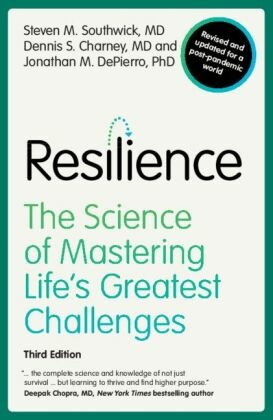Resilience - The Science of Mastering Life's Greatest Challenges
| Verlag | Cambridge University Press |
| Auflage | 2023 |
| Seiten | 244 |
| Format | 13,0 x 19,7 x 1,6 cm |
| Gewicht | 320 g |
| Artikeltyp | Englisches Buch |
| EAN | 9781009299749 |
| Bestell-Nr | 00929974UA |
How do we become resilient? Three experts provide practical steps for overcoming stress and becoming more resilient to life's challenges.
Life presents us all with challenges. Most of us at some point will be struck by major traumas such as the sudden death of a loved one, a debilitating disease, or a natural disaster. What differentiates us is how we respond. In this important book, three experts in trauma and resilience answer key questions such as What helps people adapt to life's most challenging situations?, How can you build up your own resilience?, and What do we know about the science of resilience? Combining cutting-edge scientific research with the personal experiences of individuals who have survived some of the most traumatic events imaginable, including the COVID-19 pandemic, this book provides a practical resource that can be used time and time again. The experts describe ten key resilience factors, including facing fear, optimism, and relying on role models, through the experiences and personal reflections of highly resilient survivors. Each resilience factor will help you to adapt and grow from stres sful life events and will bring hope and inspiration for overcoming adversity.
Inhaltsverzeichnis:
1. What is resilience?; 2. Optimism: belief in a brighter future; 3. Face your fears; 4. Moral compass; 5. Religion and spirituality; 6. Social support; 7. Role models; 8. Mind your body; 9. Challenge your mind; 10. Cognitive and emotional flexibility; 11. Meaning, purpose, and growth; 12. The practice of resilience; Resilience facing death: a tribute to Dr. Steven Southwick.
Rezension:
'There is no resilience without adversity. Unfortunately, we live in a dangerous world. This book, written by world leaders on the science of resilience, is a must read for everyone. Certainly professionals who help others through stressful or traumatic experiences would profit from the knowledge shared, but every single person will learn how to manage challenges better. The authors include very easy-to-read clear suggestions backed by decades of neuroscience research and from the stories of multitudes of resilient survivors. Every clinician from novices to experienced clinicians has something to learn from this gem. The lessons in this book are what we should teach our children.' Barbara Olasov Rothbaum, Ph.D., ABPP, Director of the Emory Healthcare Veterans Program and the Trauma and Anxiety Recovery Program and Paul A. Janssen Chair in Neuropsychopharmacology. Department of Psychiatry, Emory University School of Medicine

